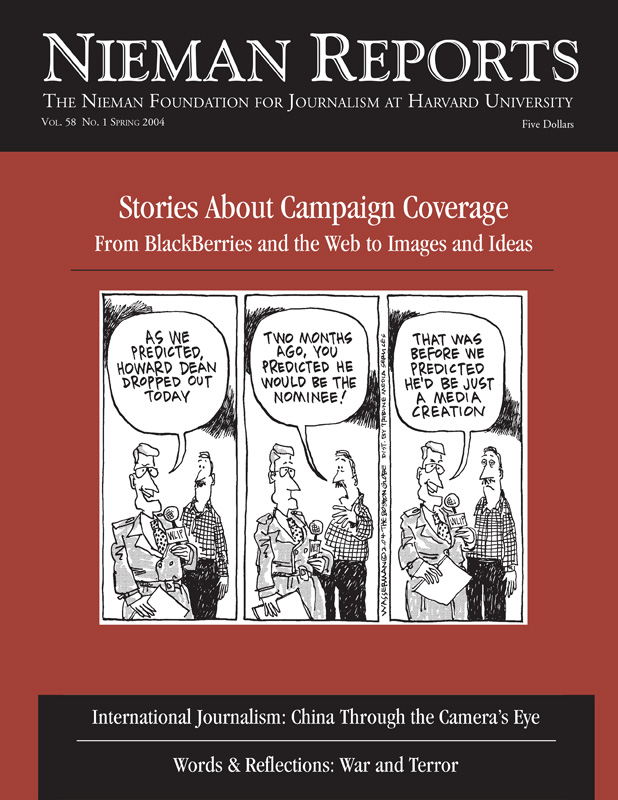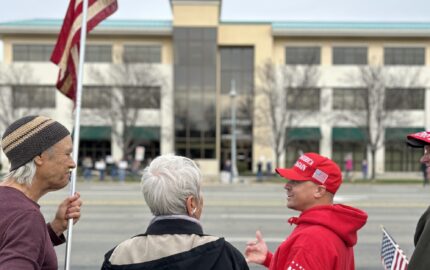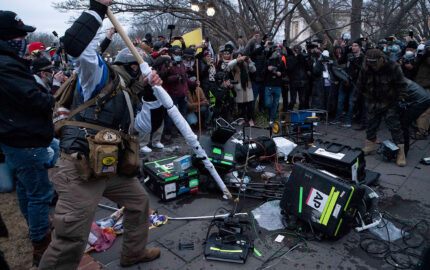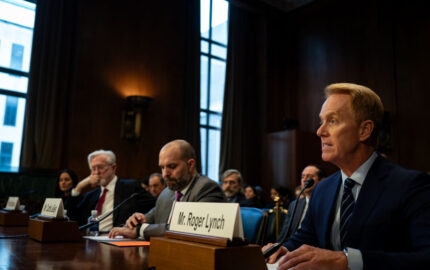
Strategists for former Vermont Governor Howard Dean’s presidential campaign found a new way to use the Internet to perform very old campaign routines: raising money, signing up and facilitating discussions with supporters, and organizing a grass-roots community to contact voters and knock on doors.
Political journalists found an easy way to read lots of newspapers and follow political developments in other states by tapping into Web sites that overflowed each day with stories about the campaign. By doing so, many reporters gained a deeper understanding about the potential of their beats.
And in New Hampshire, PoliticsNH.com—an aggressive, fledgling Internet news organization—sprang up with little overhead and demonstrated new ways of reporting and documenting the state’s presidential primary process—quickly, comprehensively and accurately. In doing so, it offered political junkies, journalists and campaigns a fresh approach to covering elections.
PoliticsNH.com Is Born
In July 2002, I became PoliticsNH.com’s first and only full-time reporter. When I arrived to operate the Web site, one person worked on it, and he did so in his spare time. It had an audience of about 500 people per month. During the next 18 months, our staff grew to include five other full-time reporters and, in time, attracted an average of more than 20,000 unique visitors daily—without spending any money on advertising.
PoliticsNH.com’s growth and popularity can largely be explained by a series of factors:
- Our target audience—of leading politicians, opinion makers, political activists, and journalists—is already very connected to the Internet.
- New Hampshire is a small state, and this allows one reporter to easily cover what happens in it.
- The state’s political establishment is inclusive, so phone numbers and campaign information are easily shared.
- Besides one dominant TV station, New Hampshire’s media are made up of a number of small news outlets with limited resources and a lack of commitment to constantly updating their Web sites.
These realities created the opportunity to fill a breaking political news vacuum. While in Iowa, The Des Moines Register invests the resources to cover politics far beyond what its rivals attempt, in New Hampshire, Manchester’s Union Leader is the only paper with a statewide circulation—and it still only reaches 66,000 readers. (The Concord (N.H.) Monitor, known for its political coverage, reaches 22,000, and The Boston Globe has significantly cut its number of New Hampshire reporters.) In the summer of 2002, with the first whiff of campaigns in the air, I sensed there were a lot of reporting opportunities to be had and an audience—both in New Hampshire and with political junkies everywhere—waiting to be built.
To succeed, we became different. News organizations—with a responsibility to explain issues and track what candidates say for their readers—geared their coverage to what voters needed to know. PoliticsNH.com would have a different responsibility because the site would attract a different group of readers. Those who came to our site would already be in tune with politics, and most likely they’d know whom they’d be voting for or didn’t care who would win. Many were working or advising campaigns or were the journalists covering the campaign.
I could almost see my journalism and political science professors cringing when I was quoted in the Concord Monitor as saying, “I don’t care about policy” in the context of what I do for the Web site. But our audience already knew what they wanted to know about issues, so I focused our site’s reporting on the inside-baseball game of politics. We didn’t do candidate profiles, but we did do profiles of the campaign managers. We didn’t report any specifics about candidate’s health care plans, but we did pass along what we found out when we talked to those who helped to craft these proposals. We never did try to tell the what-this-cam-paign-means story, but we covered campaign office openings in Nashua.
Reporting Inside the Political Bubble
What happens in politics exists within an informal “bubble” of activists, politicians and opinion makers. I saw my job as a PoliticsNH.com reporter was to move around within that bubble and explain what was happening inside of it to our audience. But I found—as I worked within this bubble—that it got very, very crowded as a lot of political journalists spent a lot of time doing just what I was doing. This surprised me because I expected that most political journalists would be working outside of the bubble to bring news about the campaign, candidates and issues to their nonpolitically active audience.
Technology also helped PoliticsNH.com to create this new political beat. In 2000, when I covered my first presidential campaign, choices were more limited for political journalists: stay in the newsroom near to a phone, e-mail and fax and follow news events or go out in the field with a candidate and listen to the same stump speech again and again. But in this campaign, I could take my portable gadgets—my cell phone, BlackBerry wireless e-mail device, and a laptop—and report and administer the PoliticsNH.com Web site from the road and never leave my newsroom.
Having this flexibility allowed me to meet the needs of political junkies both outside and inside New Hampshire, a state where politics is its major league sport. It’s a place where elections occur often: its House of Representatives has 400 members, and most of the state’s elected officials have two-year terms. This means an election is always just around the corner. And because it hosts the state’s first-in-the-nation presidential primary, the country’s political elite follow state’s political happenings closely.
The public appetite for Web-based political news—combined with my willingness (as a single man in my mid-20’s) to work around the clock and my passion as a political junkie, as well as my ability to gather sources and news—gave the project its chance to succeed. PoliticsNH.com is a for-profit business, set up with the hope of creating a longstanding framework in which the larger story of New Hampshire politics continues to be told. Already, by illuminating the grass-roots and insider stories of this race, we were able to influence ways in which the primary was covered by other journalists.
In the spring of 2003, when there were few ways to gauge how a campaign was doing, several newspapers quoted how many endorsements each candidate received on a chart we’d made of the 105 most influential people in the state’s Democratic presidential primary. Out-of-state journalists covering their hometown candidate’s campaign used PoliticsNH.com to get a feel for how the candidate was doing. National journalists used PoliticsNH.com to get a reading on which campaign was putting together a better ground game.
RELATED ARTICLE
"For Whom Is Political Coverage Written?"
- John WagnerCertainly, we aren’t the only ones trying to use the Web in new and different ways during this election cycle. Political journalists who write for newspapers use their paper’s Web sites to tell stories they didn’t have room to tell in print. For example, John Wagner, who is covering his home state’s U.S. senator and presidential candidate, John Edwards, for The (Raleigh, N.C.) News & Observer, tracks many details of his campaign (that he doesn’t file to the paper) on the paper’s Web site. St. Petersburg (Fla.) Times reporter Bill Adair kept an online diary on the Times’s Web site while he covered Florida Senator Bob Graham’s campaign travels. The Des Moines Register gave its caucus campaign reporter, Tom Beaumont, an online column.
One thing seems clear: In the future, political journalists will need to understand better how to use the Internet and how to make it work for them—and their readers—in this era of ever quicker news cycles, limitless amounts of information, and increased competition. In tracking political process and the horserace aspects of coverage—by keeping watchful eyes on money, endorsements, polls and staff changes—the Internet can be an ideal tool.
James Pindell is managing editor for PoliticsNH.com in Manchester, New Hampshire. He is a graduate of both Drake University and the Columbia University Graduate School of Journalism.


